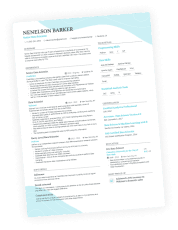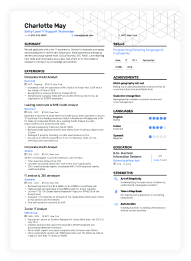Data Management Skills: Example Usage on Resumes, Skill Set & Top Keywords in 2024
Including data management on your resume signals to recruiters your ability to organize and handle complex information efficiently, reflecting your attention to detail and analytical prowess. Peruse the guide below to find inspiration for crafting an effective resume, exploring alternative terms and potential skill highlights.


Is your resume ATS-friendly?
Drop your resume here or upload a file to find out if the skills in your resume are readable by an ATS.
Data management skill involves the proficient handling of data that a business or organization collects. It includes collecting, storing, organizing, protecting, verifying, and processing essential data to ensure it's accurate, accessible, and secure. Having this skill means you're able to work with various data software, understand different types of data storage, and keep sensitive data safe from breaches. It also implies you can use data to help a company make informed decisions. By showcasing this on your resume, you demonstrate to potential employers that you have the ability to handle one of their most valuable resources—information.
While adding data management to your resume can be beneficial, there are some drawbacks to consider. Overstating this skill may lead to unrealistic expectations that you might not be able to meet, which can damage your credibility. If data management isn't a primary component of the job you're applying for, it might also be seen as irrelevant. Instead, it would be wiser to match your skills with the job description provided by the employer. If data management is a core aspect of the job, then make sure to highlight your relevant experience and provide specific examples of how you've successfully managed data in previous roles.
In this article, you will learn:
- Different ways to showcase your data management skills effectively on your resume.
- Some common pitfalls to avoid when listing this skill on your resume.
- Alternative skills and phrases that align with data management for a well-rounded application.
Misusage of data management on resumes
Effective data management is a critical skill that can make or break the functionalities of various job roles. However, exaggerating or misrepresenting your abilities in this area on your resume could lead to significant issues, with a gap between expectations and actual performance. Employers seek candidates with credible skills who can handle data with precision and effectiveness across all sections of their resume.
- In the summary section: Claiming to have “Expertise in managing extensive databases” when you have only used basic functions in Excel misrepresents your skill level.
- Within the experience section: Writing “Led a data management team” for a project where you were only responsible for data entry tasks inflates your role and responsibilities.
- In the achievements section: Stating “Achieved 100% data accuracy in all reports” without context or proof could question your honesty if you cannot substantiate this during an interview.
How to demonstrate data management skills on your resume
- List specific data management tools and technologies you are proficient in, such as SQL, NoSQL, Excel, or data visualization software like Tableau.
- Detail any projects where you have successfully collected, cleaned, and analyzed large datasets, emphasizing your analytical thinking and problem-solving abilities.
- Highlight experience in developing and maintaining databases, as well as creating protocols for data security and backup to demonstrate your organizational skills and attention to detail.
- Include instances where you have effectively communicated complex data-related findings to non-technical stakeholders, showcasing your ability to simplify intricate information.
- Reference any relevant certifications or training programs you have completed that are related to data management to show your dedication to professional development in this area.
Example 1: Demonstrate data management in the experience section
- •Analyzed over 100 datasets to identify key trends, which improved strategic business decisions by 20%.
- •Implemented a new data visualization tool that resulted in time savings of 15% for the reporting team.
- •Led a project to clean and merge multiple data sources, increasing data accuracy and accessibility for cross-functional teams.
- •Collaborated with IT to enhance data security, reducing potential data breaches by 30%.
- •Developed a new patient information system that decreased record retrieval times by 40%.
- •Trained a team of 10 on data management best practices, enhancing overall efficiency.
- •Regularly performed database backups and established recovery procedures, ensuring data integrity.
- •Spearheaded the development of a governance framework that improved data standardization across all departments.
- •Provided expertise in managing educational data, enhancing the accuracy of reporting by 25%.
- •Created detailed documentation on data management procedures, which serves as the company framework.
- A clear display of work experiences with specific, measurable achievements shows the ability to effect positive change.
- Recent, relevant job positions with date ranges provide a timeline of professional growth and commitment.
- Descriptive bullet points tied to business outcomes demonstrate the ability to meet and exceed job requirements.
- Using quantifiable results such as percentages and time saved gives a factual and convincing account of capabilities.
- Diverse tasks across different roles illustrate adaptability and a broad skill set in data management.
Example 2: Demonstrate data management in the summary section
- Highlights substantial work experience, giving a sense of stability and expertise.
- Clearly lists specific technical skills, indicating proficiency and relevance.
- Focuses on the achievement aspect, showing capability and results-driven mindset.
- Expresses a genuine interest in goal alignment and progress, which emphasizes the applicant's commitment to growth.
- Uses a professional tone and industry-relevant language, avoiding overused phrases and vague qualifiers.
Example 3: Demonstrate data management in the achievements section
- This achievements section clearly demonstrates the applicant's impact, by quantifying success with percentages.
- The applicant's achievements are specific and show measurable outcomes rather than just actions.
- Titles are concise, allowing readers to quickly understand the nature of each achievement.
- Descriptions provide context, detailing how success was achieved and over what period.
- Use of numerical data adds credibility to the claims and makes the impact easier to gauge.
- The format is clean and straightforward, steering clear of overly technical jargon or buzzwords.
- The achievements are framed around widely valued business metrics like revenue, costs, and customer satisfaction.
What are the relevant certifications for data management skills on resume
Enhancing your resume with a data management certification can open doors to advanced career opportunities and skills recognition.
The top 5 certifications for gaining data management skills expertise:
This certification verifies your data management expertise and can help you gain recognition as a knowledgeable professional in data governance, data quality, and data analysis.
Geared towards individuals managing big data, this certificate allows you to exhibit your skills in designing big data solutions and illustrates your proficiency in IBM's technologies.
This entry-level certification confirms your basic understanding of core data concepts and how they're implemented using Microsoft Azure data services, aiding in cloud data management roles.
By acquiring this certification, you demonstrate advanced analytics skills, including the ability to manipulate and gain insights from big data using SAS and other tools, critical for data science roles.
This certificate is aimed at those who want to showcase their skills in building and managing data solutions on Google Cloud Platform, highlighting your proficiency in cloud data services and infrastructure.
Top skills people add together with data management skill on resume:
Database Management
SQL
Data Analysis
Business Intelligence
Microsoft Excel
Data Mining
Data Visualization
Big Data
ETL (Extract, Transform, Load)
Machine Learning
Problem-Solving
Attention to Detail
Analytical Thinking
Communication
Time Management
Adaptability
Teamwork
Organization
Critical Thinking
Project Management
Creativity
Most relevant jobs for data management skills
Data management skills are crucial in various roles that focus on the storage, organization, and analysis of data. These abilities are fundamental in positions where data accuracy and accessibility are vital for decision-making and business intelligence. As organizations rely heavily on data to drive strategies and improvements, professionals who can handle large data sets effectively are in high demand.
- Data Analyst
- Data Scientist
- Database Administrator
- Data Engineer
- Business Intelligence Analyst
- Information Technology (IT) Manager
- Data Quality Manager
- Data Governance Specialist
- Data Warehouse Architect
- Master Data Manager
Key takeaways
- Data management skills enhance your resume by showing your ability to organize and analyze information effectively.
- To avoid misusing data management abilities, be aware of ethical considerations and prioritize accuracy and security in your handling of information.
- On your resume, illustrate data management expertise through specific examples of past work experiences and the positive outcomes that resulted from your skillset.
Make one that's truly you.




